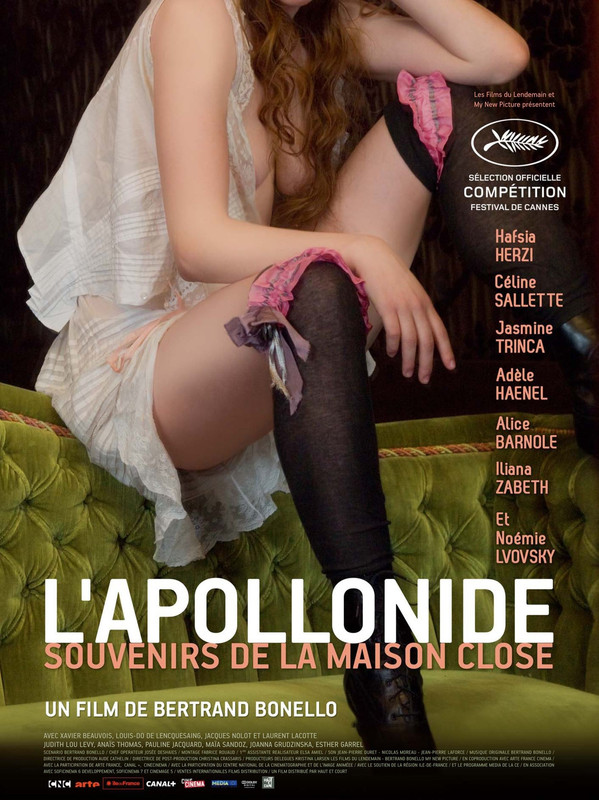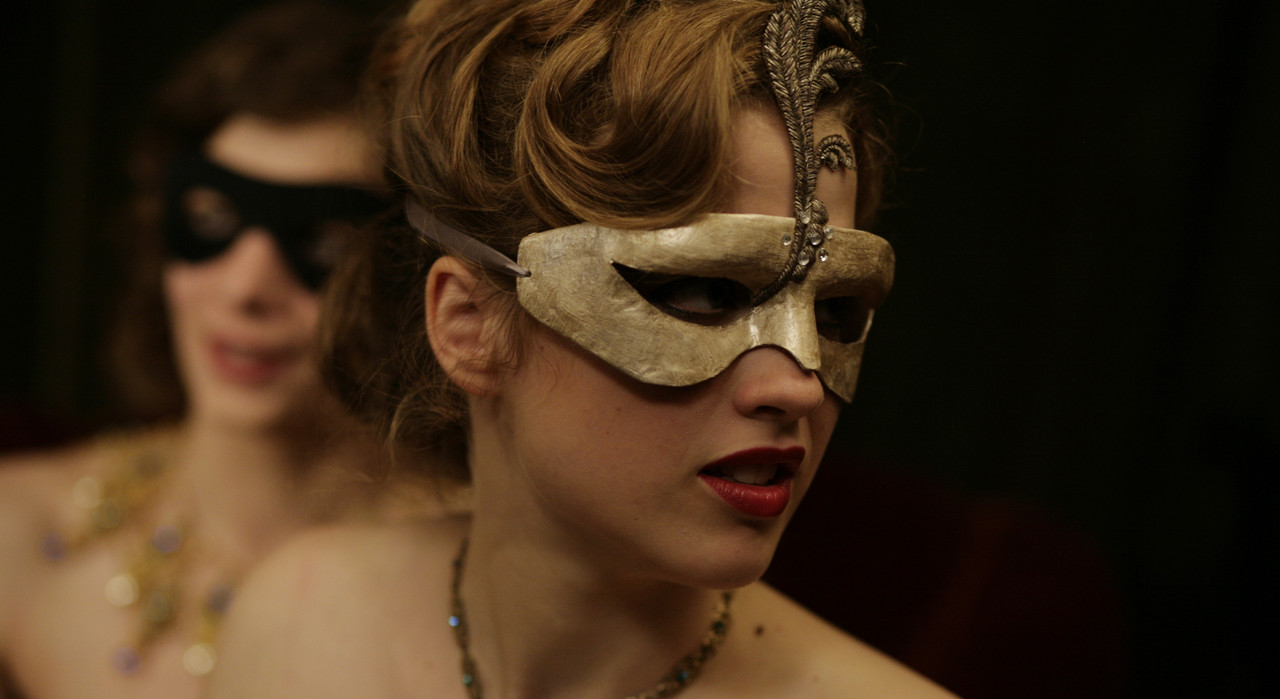Bertrand Bonello's latest has attracted diverse opinions, most of which seem to tend to one end of the scale or the other. It's not hard to see why people have loved it or why they have hated it, and that's really why I've been feeling quite torn on it.
The film takes place almost entirely within the confines of an upscale - but, we soon learn, financially precarious - brothel run by Madame Marie-France (Noemie Lvovsky) in 1900. We are plunged completely into this world, where the girls live, sleeping much of the day and taking care of clients ("Shall we have commerce?") all night. Through a multiplicity of characters we see all the workings of this place, particularly how the girls are, for the most part, trapped in their work by impossible to repay debts to the otherwise rather motherly Marie-France. For most the chance of escape will only come along if one wealthy client takes such a shine to them that he will pay her debts and marry her.
The brothel - called L'Apollonide, also the film's original title - is a whole world, and it has a large and wide ranging cast of characters, few of whom are likely to be very familliar faces to UK audiences. The good news is that the whole cast is excellent. Characters feel as though they would have been rather sketchy on the page (and it's true, some do blend into the background) but the actresses in the main roles bring plenty of personality to their performances.
It's a surprise that Hafsia Herzi, who plays the dark skinned Samira is top billed, because her character seems to have less to do and a rather more simplistic role (her colour makes her a novelty for clients) in the film, which isn't to say that she's bad, but may indicate that some of her scenes were cut. If any one character can be said to be the lead then it is Clotilde (Celine Salette), now 28 and a 12 year veteran of the trade, who turns increasingly to morphine, while hoping that her favourite client will pay her debts off. Salette easily has the biggest character arc, and she plays it with great emotion, but also with great restraint.
Among the other notables are Water Lilies' Adele Haenel as Lea, probably the most matter of fact of the prostitutes; Jasmine Trinca as Julie, whose relationship with one client could do with a bit more development; Alice Barnole, who makes a creditable debut as Madeleine, whose face is disfigured early in the film, and whose storyline is probably the most affecting and Iliana Zabeth, excellent as 16 year old new recruit Pauline.
The problem that Bonello creates himself is that despite a rather lengthy feeling 122 minute running time, the various small stories never quite cohere into an overall narrative that drives the film forward, and the fact that there are too many characters for all of them (or even many of them) to come into sharp focus means that the langourous pace can become wearing and the lack of plot frustrating, even though the film is beautiful and well acted.
Bonello's visuals emphasise the two sides of the girls lives: the (likely fake) opulence of the brothels and client rooms, juxtaposed with the plain shared rooms that they sleep and eat in. While there is copious nudity (from all the prostitutes apart from Haenel), the film's sex isn't terribly explicit. Bonello is less interested in the act than in the before and after. When Pauline arrives at L'Appollonide there is a long sequence taking her (and us) through the whole process the girls go through to prepare for one client and freshen up for the next. As well as the preparation, Bonello also looks at the consequences of these transactions, physically in terms of Madeleine's Joker-like scars, spiritually through Clotilde's relationship to her favourite client, and medically through a sequence in which a doctor comes in to check all the girls for diseases. All of this is beautifully captured, as Bonello's camera glides through this insular world.
Period detail is quite strong, but that doesn't mean that Bonello is afraid of a few anachronistic moments. Madeleine's nickname - the woman who laughs - is a nod to a Conrad Veidt film from 1928, but more notable is the use of music - soul over the opening credits, Nights in White Satin over a wake - that brings this modernism into the film in the most striking, and most interesting, ways (it works here in a way it doesn't in, for example, W.E.).
There are also problems with Bonello's direction though. He is prone to repetition, and by the end develops a real tendency to overegg a point (the final shot is horrendous, and feels like Bonello yelling 'GET IT?' through a megaphone into your ear), and the film, despite at times feeling overlong, also seems to have moments missing: why, for example, does one character vanish for a time, only to re-appear without comment?
I can see the problems here, it's certainly an uneven film, there is definitely some confusion around what Bonello is trying to say with it as a whole, and I can even see why it will infuriate some viewers, but there are great things in House of Tolerance. The more I consider it the more I think it will be interesting to revisit, if only to see how my feelings about it really shake out.
★★★★☆
★★★★☆



No comments:
Post a Comment